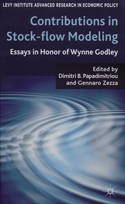
Research Topics
Publications on New Cambridge economics
-
A Levy Institute Model for Greece
Research Project Report, July 2013 | July 2013Technical Paper
In this report Levy Institute President Dimitri B. Papadimitriou and Research Scholars Gennaro Zezza and Michalis Nikiforos present the technical structure of the Levy Institute's macroeconomic model for the Greek economy (LIMG). LIMG is a stock-flow consistent model that reflects the “New Cambridge” approach that builds on the work of Distinguished Scholar Wynne Godley and the current Levy Institute model for the US economy. LIMG is a flexible tool for the analysis of economic policy alternatives for the medium term and is also the analytic framework for a forthcoming Strategic Analysis series focusing on the Greek economy.Download:Associated Program:Author(s): -
Contributions in Stock-flow Modeling: Essays in Honor of Wynne Godley
Book Series | June 2012Edited by Dimitri B. Papadimitriou and Gennaro Zezza

In the 1970s, at a time of shock, controversy and uncertainty over the direction of monetary and fiscal policy, Wynne Godley and the Cambridge Department of Applied Economics rose to prominence, challenging the accepted Keynesian wisdom of the time. This collection of essays brings together eminent scholars who have been influenced by Godley's enormous contribution to the field of monetary economics and macroeconomic modeling.
Godley's theoretical, applied and policy work is explored in detail, including an analysis of the insightful New Cambridge 'three balances' model, and its use in showing the progression of real capitalist economies over time. Godley's prescient concerns about the global financial crash are also examined, demonstrating how his work revealed structural imbalances and formed the foundations of an economics relevant to the instability of finance.
Published By: Palgrave MacMillan
Associated Program:Author(s): -
Revisiting “New Cambridge”: The Three Financial Balances in a General Stock-flow Consistent Applied Modeling Strategy
Working Paper No. 594 | May 2010This paper argues that modified versions of the so-called “New Cambridge” approach to macroeconomic modeling are both quite useful for modeling real capitalist economies in historical time and perfectly compatible with the “vision” underlying modern Post-Keynesian stock-flow consistent macroeconomic models. As such, New Cambridge–type models appear to us as an important contribution to the tool kit available to applied macroeconomists in general, and to heterodox applied macroeconomists in particular. -
Fiscal Policy and the Economics of Financial Balances
Working Paper No. 569 | June 2009This paper presents the main features of the macroeconomic model being used at The Levy Economics Institute of Bard College, which has proven to be a useful tool in tracking the current financial and economic crisis. We investigate the connections of the model to the “New Cambridge” approach, and discuss other recent approaches to the evolution of financial balances for all sectors of the economy. We will finally show the effects of fiscal policy in the model, and its implications for the proposed fiscal stimulus on the US economy. We show that the New Cambridge hypothesis, which claimed that the private sector financial balance would be stable relative to income in the short run, does not hold for the short term in our model, but it does hold for the medium/long term. This implies that the major impact of the fiscal stimulus in the long run will be on the external imbalance, unless other measures are taken.
Download:Associated Program:Author(s):
